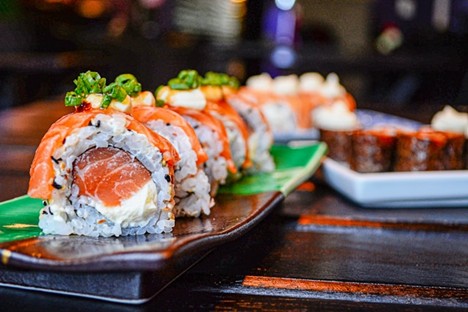
Sushi is celebrated around the world for its harmonious blend of flavors, textures, and freshness. From the delicate sweetness of fresh fish to the subtle tang of seasoned rice and the crisp bite of vegetables, every piece is crafted for a multi-sensory experience. Even nori seaweed sheets that wrap each roll contribute a unique umami note, tying the ingredients together. Yet, the culinary journey doesn’t end on the plate. Beverages play a key role in enhancing flavors, cleansing the palate, and complementing the artistry of sushi. From traditional Japanese drinks to modern pairings, understanding how to match beverages with sushi can transform a simple meal into a truly memorable dining experience.
Few beverages are as synonymous with sushi as green tea. Traditionally served before, during, or after a meal in Japanese restaurants, green tea provides more than just a warm, comforting sip. Its slightly astringent and vegetal notes help cleanse the palate, allowing each piece of sushi to shine without lingering flavors from previous bites.
Green tea also offers a gentle contrast to richer ingredients, such as fatty tuna or creamy sauces. The tannins in green tea balance the natural oils in fish, ensuring that flavors remain crisp and fresh with every bite. Beyond flavor, green tea brings subtle health benefits, including antioxidants and compounds that support digestion, making it a thoughtful companion to a nutrient-rich sushi meal.
Different types of green tea can bring unique dimensions to the pairing. Sencha, with its bright and slightly grassy flavor, complements lighter rolls and nigiri. Genmaicha, infused with roasted rice, adds a nutty undertone that pairs beautifully with eel or tempura rolls. For those seeking a more delicate option, white or jasmine teas can harmonize with mild, fresh fish, emphasizing subtle sweetness without overpowering the palate.
Sake, Japan’s iconic rice wine, offers one of the most authentic pairings with sushi. Ranging from sweet and aromatic to dry and crisp, sake has the versatility to match a wide spectrum of sushi flavors.
A dry, clean sake is ideal for delicate fish like flounder or yellowtail, highlighting the freshness of the seafood without masking its nuances. Conversely, a richer, slightly sweet sake can balance the richness of fatty tuna or salmon, providing a harmonious contrast that enhances the dining experience. Sparkling sake has also grown in popularity, offering effervescence that refreshes the palate and lightens richer dishes.
Temperature plays a role in sake pairing as well. Chilled sake accentuates delicate flavors, making it perfect for lighter nigiri or sashimi. Warm sake, on the other hand, can bring out deeper umami notes in richer rolls or cooked seafood, creating a comforting and layered flavor experience.
For those new to sake, pairing based on the intensity of the fish and the seasoning of the rice is a reliable approach. The overarching goal is balance: the drink should enhance the sushi, not compete with it.
While sake remains the traditional choice, wine offers exciting possibilities for sushi enthusiasts looking to experiment. White wines with high acidity and mineral notes such as Sauvignon Blanc or Chablis complement lighter fish and vegetable rolls. Their crispness mirrors the freshness of the sushi and enhances the natural flavors of the fish.
For richer or slightly spiced rolls, a dry Riesling or Grüner Veltliner can provide a hint of sweetness and acidity that balances heat from wasabi or spicy mayo, creating a harmonious interplay of flavors. Sparkling wines, from Champagne to Prosecco, are also excellent companions. Their bubbles cleanse the palate while their subtle flavors do not overpower the delicate seafood.
Red wines are less commonly paired with sushi, but lighter-bodied reds with low tannins, such as Pinot Noir or Gamay, can complement heartier rolls, like those with seared tuna or grilled eel, without overwhelming the flavors. The key with wine is to focus on balance and freshness, emphasizing clarity of flavor rather than intensity.

Not everyone prefers alcoholic beverages with their sushi, and a variety of non-alcoholic options can provide a similarly refined experience. Sparkling water, lightly flavored with citrus or herbs, cleanses the palate and refreshes the senses between bites.
Crafted teas, from roasted barley tea to light oolong, can mimic the cleansing effect of green tea while offering distinct flavor profiles. For a slightly sweet option, fresh yuzu or citrus-infused waters provide a zesty counterpoint to savory rolls, enhancing the natural flavors of both rice and fish. Even kombucha, with its tangy effervescence, can pair surprisingly well with sushi, cutting through richness while complementing umami flavors.
When pairing drinks with sushi, consider not only the type of fish but also the preparation, seasoning, and accompaniments. For instance, tempura rolls with crispy textures may benefit from sparkling beverages or crisp teas that contrast the fried elements. Rolls with rich sauces, like unagi or spicy mayo, pair well with slightly sweet or acidic beverages that provide balance.
Nigiri and sashimi, which showcase the fish in its purest form, are best paired with drinks that highlight their natural flavors rather than overshadow them. The goal is harmony: every sip should prepare the palate for the next bite, enhancing freshness, texture, and umami.
Seasonality can influence both sushi and drink pairings. Lighter, flakier fish in the spring and summer are complemented by chilled beverages, while richer, heartier fish in the colder months pair beautifully with warmer drinks. Seasonal ingredients in rolls can also guide beverage selection. A roasted tea or fuller-bodied sake can mirror the depth of seasonal flavors, creating a cohesive culinary experience.
Regional preferences and local ingredients also matter. For example, coastal areas with access to the freshest seafood might encourage simpler, lighter pairings, emphasizing purity and freshness. Inland or urban settings, where sushi may feature more diverse fillings or bold sauces, may invite richer, more complex beverages.
While traditional pairings provide a framework, personal preference plays a crucial role. Sushi is an art form, and its enjoyment is subjective. Some diners may prefer sweeter drinks with lighter rolls, while others might enjoy the contrast of bitter teas with rich, fatty fish. The key is experimentation: exploring different combinations, tasting mindfully, and paying attention to how flavors interact.
Engaging all senses - visual, olfactory, and gustatory - enhances the pairing experience. The aroma of a floral tea, the effervescence of a sparkling sake, or the subtle bouquet of a white wine can all heighten anticipation and enjoyment. Pairing sushi with drinks is not just about complementing flavors; it’s about creating a holistic, immersive experience that engages the palate and elevates every bite.
Pairing sushi with the right drink transforms a simple meal into a full sensory experience. Traditional choices like green tea and sake highlight authenticity, balance, and cultural heritage, while wines, sparkling beverages, and creative non-alcoholic options expand the possibilities for flavor exploration.
The art of pairing considers not only the type of fish but also preparation, seasoning, texture, and seasonality. By thoughtfully matching beverages to sushi, diners can enhance freshness, highlight subtle nuances, and enjoy a harmonious, memorable experience with every bite.
Whether indulging in a quiet home-prepared sushi night or savoring a chef’s expertly crafted rolls at a restaurant, the right drink elevates each flavor, cleanses the palate, and completes the culinary journey. For sushi lovers, understanding and experimenting with drink pairings opens a world of taste, tradition, and enjoyment that goes far beyond the plate.